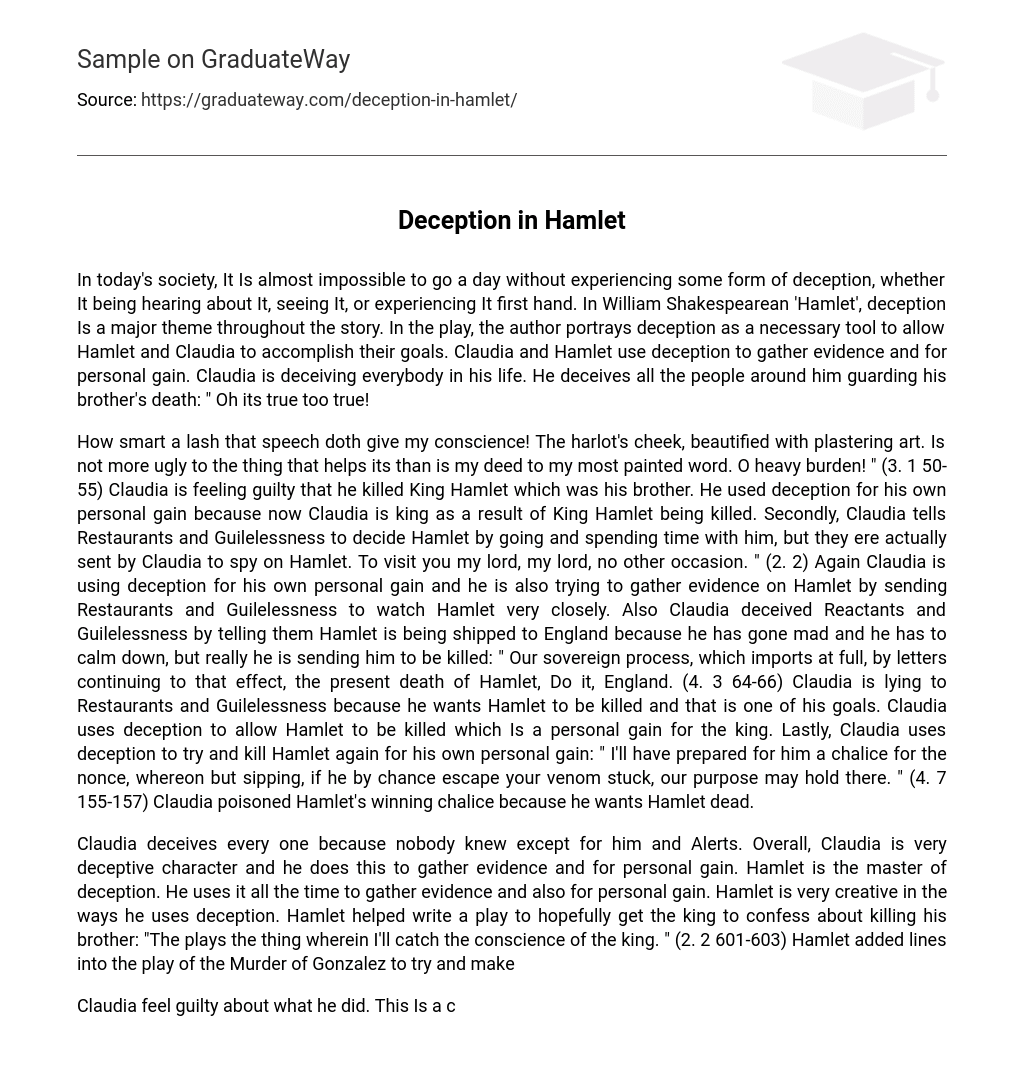In today’s society, it is nearly impossible to go a day without encountering deception in some form – hearing about it, witnessing it, or experiencing it ourselves. William Shakespeare explores the theme of deception extensively in his play ‘Hamlet’. The author depicts deception as a crucial tool for Hamlet and Claudia to achieve their objectives. Both characters employ deceit to gather information and for their own personal benefit. Claudia, in particular, deceives everyone in his life as he conceals the truth about his brother’s death, exclaiming, “Oh it’s true, too true!”
The conscience is smartly lashed by the speech, a harlot’s cheek made more repugnant by artificial adornment, just as my deed is to my deceitful words. What a heavy burden! (3.1 50-55)
Claudia feels guilty for murdering his brother, King Hamlet, as it benefited him and made him the king. He manipulates Rosencrantz and Guildenstern to spy on Hamlet under the pretense of visiting him for no specific reason. (2.2)
Claudia deceives Rosencrantz and Guildenstern again by falsely claiming that Hamlet is being sent to England due to his madness and needs to calm down, when in reality he intends to have him killed: “Our command, backed by letters confirming Hamlet’s present death, Do it, England.” (4.3 64-66)
Through deception, Claudia aims to have Hamlet killed, which serves his personal gain as the king.Lastly, Claudius resorts to trickery in a further attempt to kill Hamlet for his own benefit. He states, “I’ll have prepared for him a chalice for the nonce, whereon but sipping, if he by chance escape your venom stuck, our purpose may hold there.” (4.7 155-157) This reveals that Claudius poisons the chalice that Hamlet is supposed to win, as he desires Hamlet’s demise.
Both Claudia and Hamlet are deceptive characters, using deceit to their advantage and for personal gain. Claudia’s deception goes unnoticed by everyone except for him and Alerts. Similarly, Hamlet is a master of deception, using it frequently to gather evidence and further his own interests. Hamlet showcases his creativity in the various ways he employs deception, such as helping write a play in hopes of obtaining a confession from the king regarding his brother’s murder: “The plays the thing wherein I’ll catch the conscience of the king” (2.2 601-603). Additionally, Hamlet even adds lines to the play of the Murder of Gonzalez, aiming to manipulate the situation.
Claudia feels guilty about his actions. This is a clever use of deception because he could have been killed. He discovered this and then altered the names on the letter to “Restaurants” and “Guilelessness” instead of his own name: “I had my father’s signet in my purse, which was the model of that Danish Seal: I folded the writ in the shape of the other, signed it, gave it the impression and placed it safely, without anyone knowing about the switch. Now, the next day was our sea-flight; and what followed from this, you already know.” (5. 2) Hamlet deceives his friends.
Restaurants and guidelines are suggested to be assassinated by the king of England instead of Hamlet. This self-serving action is motivated by the king’s preference for their demise over his own. Additionally, Hamlet confesses to his friends that his apparent madness is a deceitful act: “I may choose to put on a strange behavior in the future, with the intention that you will never recognize it as such when you see me in those moments.”





